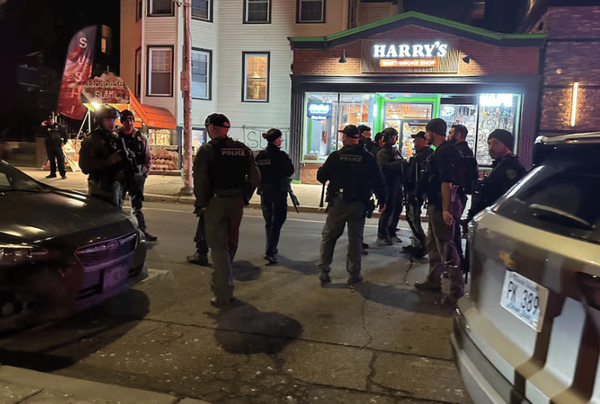
On June 18, 2025, a Norfolk County jury delivered a sensational verdict in the retrial of Karen Read.
The jury acquitted her of second‑degree murder, manslaughter while intoxicated, and leaving the scene of an accident causing death, while convicting her only on operating under the influence, resulting in one year of probation.
The case—marked by controversy, conspiracy theories, and courtroom drama—has been a lightning rod of discussion on X, dividing true crime fans into two vocal camps. For a touch of humor, some only just learned about the case when the verdict was announced.
Am I the only person in America that doesn't know a single detail of who Karen Read is or what happened. Haven't read a single article on it or cared.
— Anthony (@AnthonyG0528) June 18, 2025
In case you’re like Anthony, here’s what you missed: In January 2022, Boston police officer John O’Keefe was found dead in a snowbank outside a Canton, Massachusetts, house party. Prosecutors alleged his girlfriend, Read, 45, struck him with her Lexus SUV during a night of heavy drinking, then fled the scene.
Whatever the VERDICT is!! The FBI is coming for the REAL murderers!!! #KarenRead #FreeKarenRead pic.twitter.com/jBRi8UWmeV
— Justice Matters (@MarieSmith26453) June 18, 2025
According to Read, O’Keefe was injured during a party at another officer’s home. Her defense said evidence was mishandled, and that a police conspiracy aimed to scapegoat her.
Because of that controversy, some fell into the ‘Read is innocent’ camp. Once the verdict was read, those inclined to think she didn’t do it celebrated the decision.
It's pretty funny that it took this Karen Read trial for a lot of gen x and boomer massholes to realize the police might be corrupt
— Xanny DeVito (@trevorstweetss) June 18, 2025
The first trial
It was a long road to get there, though. The first Read trial, in 2024, ended in a hung jury. The retrial began in April 2025, with a revamped defense team and prosecutor bringing new evidence and expert testimony. After 21 hours of deliberation, the jury convicted Read of DUI but acquitted her on the gravest charges.
I was legit rooting for Karen Read. She got a DUI and that's it. She didn't kill that man. Now can we look at the actual killers? His fellow co-workers.
— Tech Supreme (@TechSupreme) June 18, 2025
Legal analysts suggest the prosecution’s case relied heavily on circumstantial evidence and a deeply flawed investigation—including inappropriate texts from a lead detective—while the defense raised reasonable doubt around the cause and location of O’Keefe’s injuries.
I believe that Karen Read is factually innocent.
— Marc J. Randazza
But I also believe that the process was bent so hard against her, that even if she were guilty, it is right and just that the trial did not end in a conviction.
The gov’t should never get away with what it tried to do here

(@marcorandazza) June 19, 2025
One expert called it “a compromise verdict.” The jury acknowledged intoxication, but was not convinced that Read caused O’Keefe’s death. Still, the verdict wasn’t celebrated in all corners:
Attention “Free Karen Read” lunatics:
— Mama Llama (@MamaLama43) June 19, 2025
No one else is going to be charged in John O’Keefe’s death. The only person who ever will be is Karen Read.
The FBI isn’t coming—they already came.
After being duped by Karen Read and her lawyer, they investigated the false claims and… pic.twitter.com/9834dxXQ86
Why do some people think Read is guilty?
Suggesting Read’s guilt, multiple witnesses testified that Read repeatedly said, “I hit him, I hit him,” after O’Keefe was found in the snow. Prosecutors argued this was a confession, made while she was distraught and intoxicated.
July of 2023 I was presented the Karen Read defense (by someone connected to the defense). After that on my own, I looked at court documents, spoke with police and attorneys I trust, and determined her conspiracy theory was not credible. In this retrial, the defense abandoned the… pic.twitter.com/K9553x1CqZ
— John DePetro Show (@JohnDePetroshow) June 19, 2025
Meanwhile, photos showed a broken tail light and damage consistent with a collision with a person. The prosecution argued that the vehicle damage aligned with O’Keefe being struck, then left outside in freezing conditions. Read critics say this is hard physical evidence.
O’Keefe was found just outside the home of Brian Albert, where Read allegedly dropped him off. The prosecution argued that the injuries were consistent with a vehicular impact followed by hypothermia, making her story implausible.
Karen Read not being convicted of second degree murder makes me sad for the human race. I’m sad that we have leaders and people with influence in this world who can so easily sell pieces of their souls for money, attention and followers.
— ErinB (@erina_christina) June 18, 2025
Where is the empathy and compassion for…
Among other arguments, including inconsistencies in Read’s timeline, Read’s toxicology report, no direct evidence of a conspiracy, Read’s bizarre, erratic, and manipulative behavior after the incident, some people think the evidence points toward a tragic drunk-driving incident, not a complex police cover-up.
While the jury found reasonable doubt, many still view her as culpable based on the initial forensic evidence, her own words, and her behavior after O’Keefe’s death.
I still have hope. This isn’t a sporting event—so I haven’t “thrown in the towel.”
— Mama Llama (@MamaLama43) June 18, 2025
But let’s be real—common sense says there’s at least one, probably more, Free Karen Read freak on that jury.
Worried about the SJC ruling?
Clips aren’t evidence?
Confused about whether she was… pic.twitter.com/gOm1Rz9HmX
The Karen Read case was a trainwreck we couldn’t stop watching
The Karen Read case featured a stunning mix: a compelling, flawed defendant, police conspiracy allegations, a tragic victim, bungled investigations, court exhibits involving blood in Solo cups, and allegations of planted evidence—all documentary fodder for true crime lovers.
With multiple docuseries, podcasts, and a high-profile blogger known as “Turtleboy” fueling the discussion, the trial became impossible to ignore.
My boss expecting me to work while I am awaiting a Karen Read jury verdict. #KarenReadTrial pic.twitter.com/YQXL2qQ22a
— Sar (@sar_alice) June 18, 2025
The Karen Read verdict is far more than a court ruling—it’s a case study in how modern true crime captivates, divides, and explodes online. Its viral reach underscores how a single case can ignite national debate when it touches on weak evidence, powerful imagery, and cultural mistrust in institutions.







